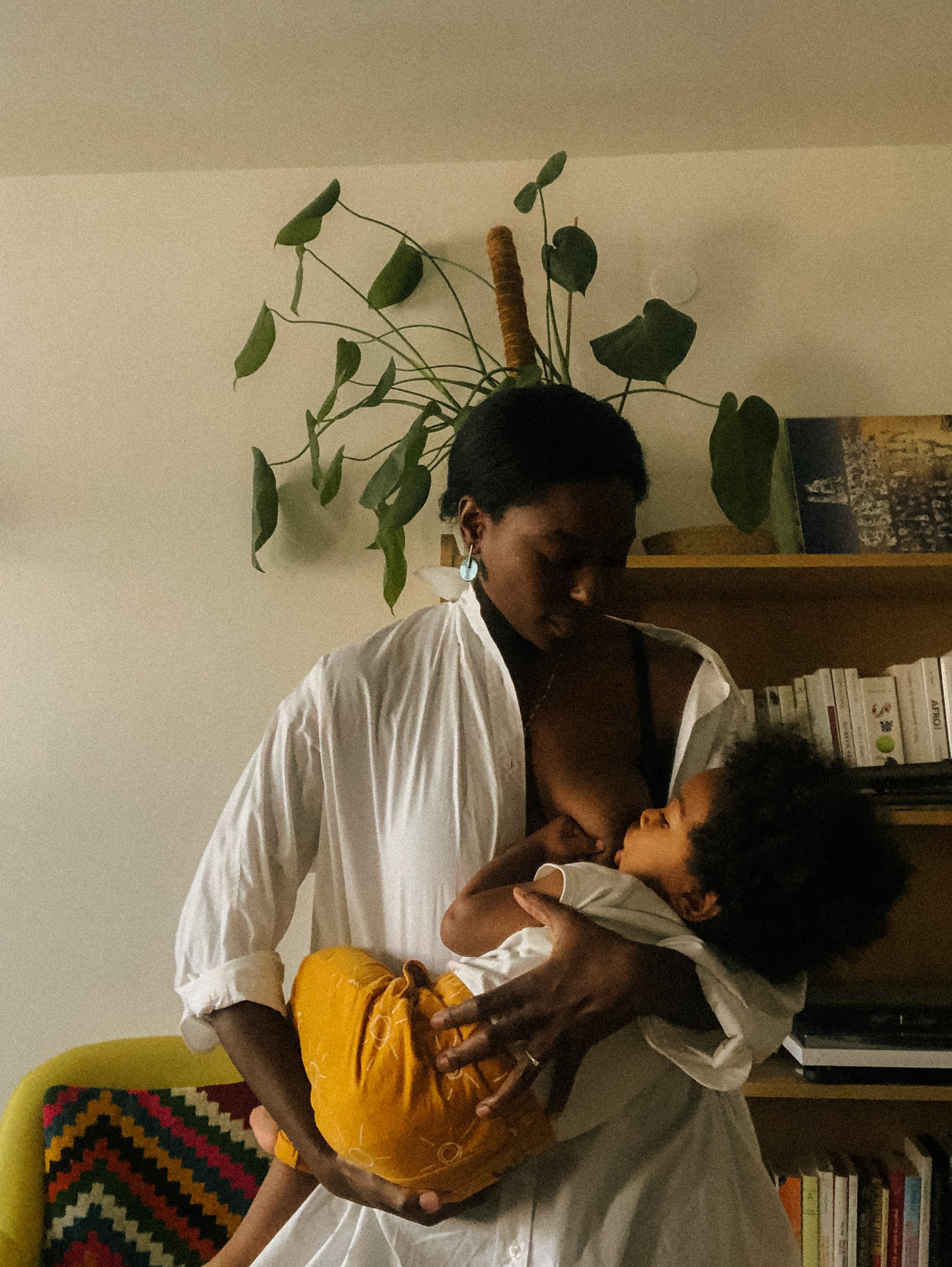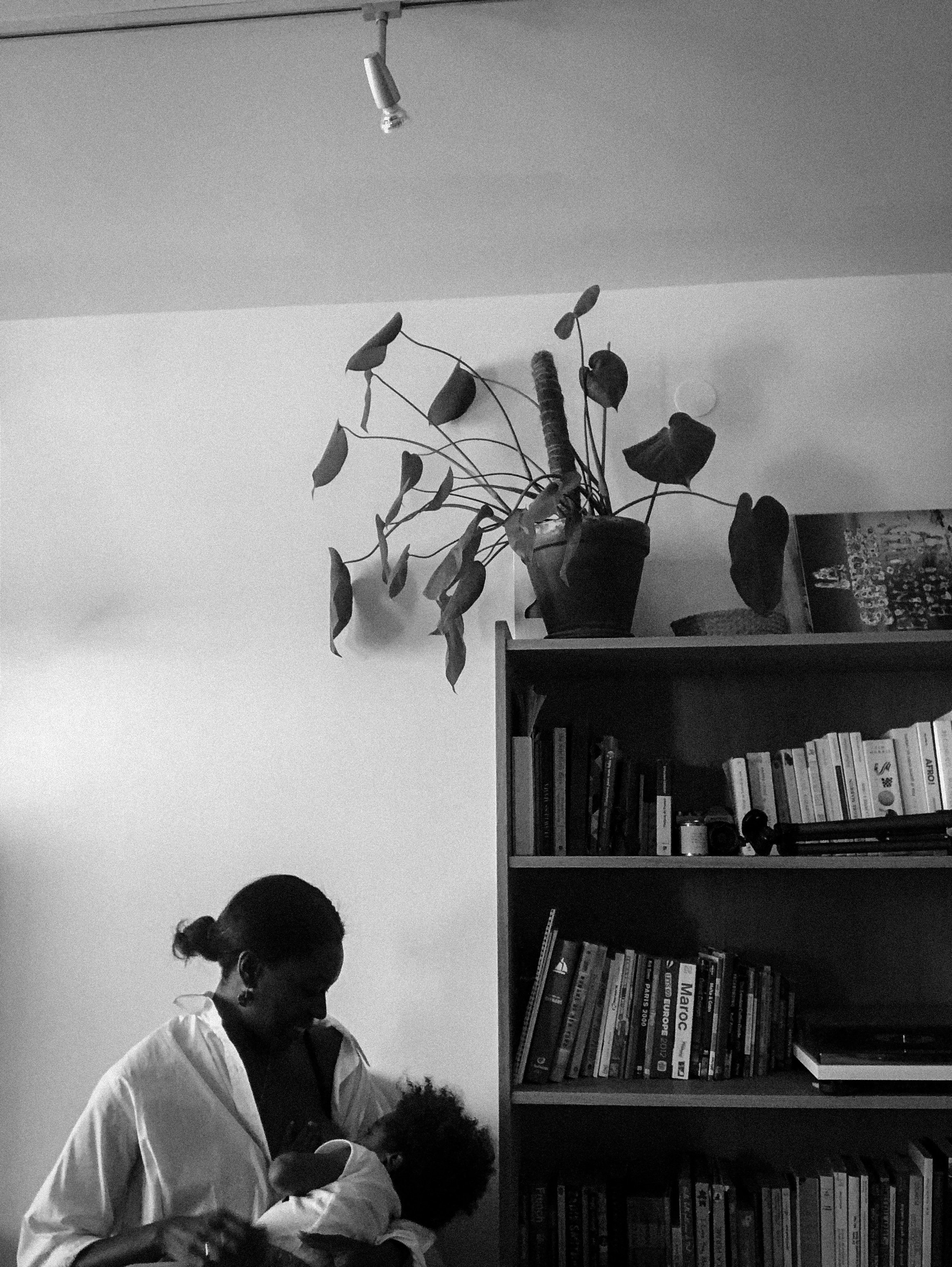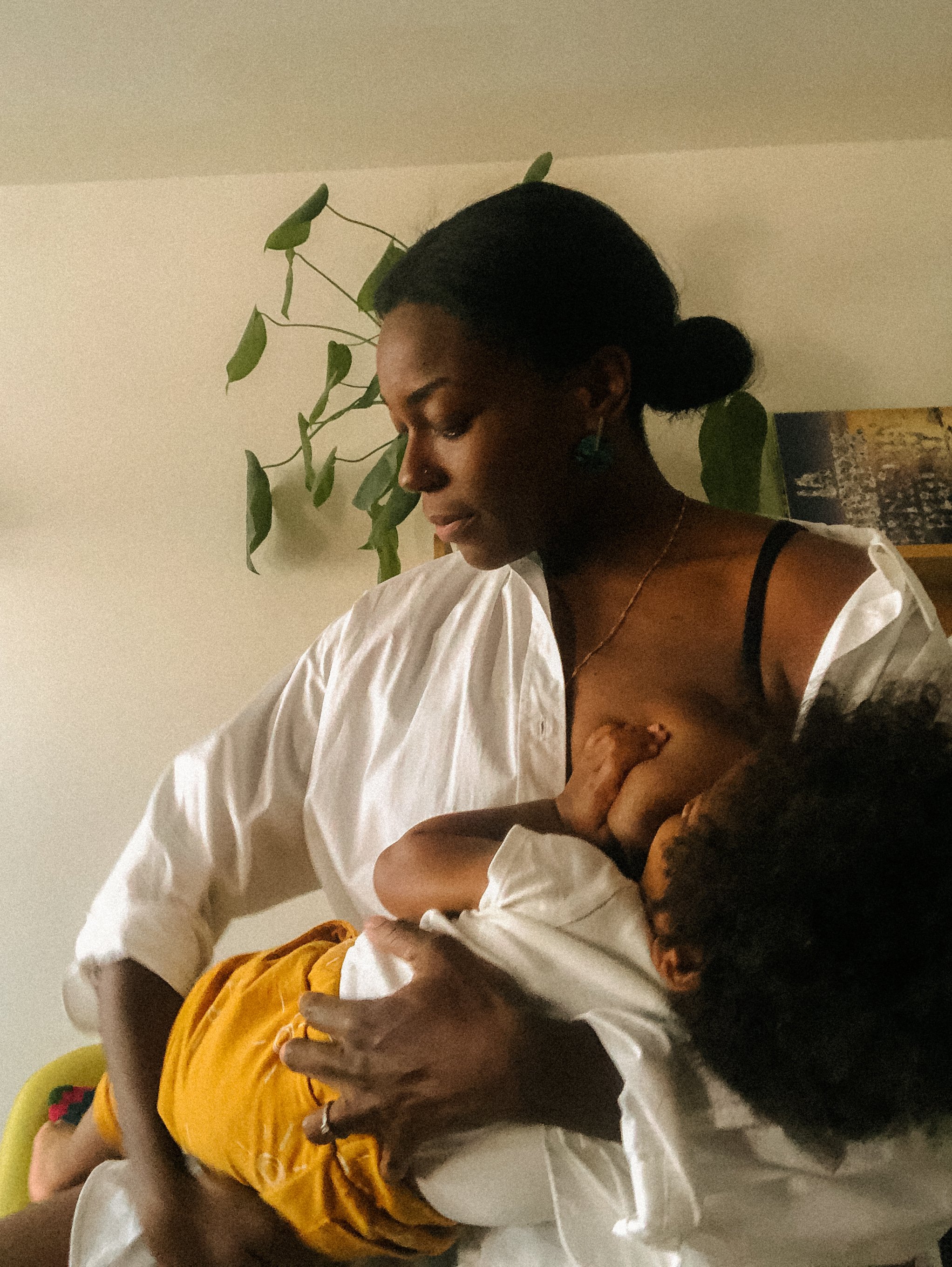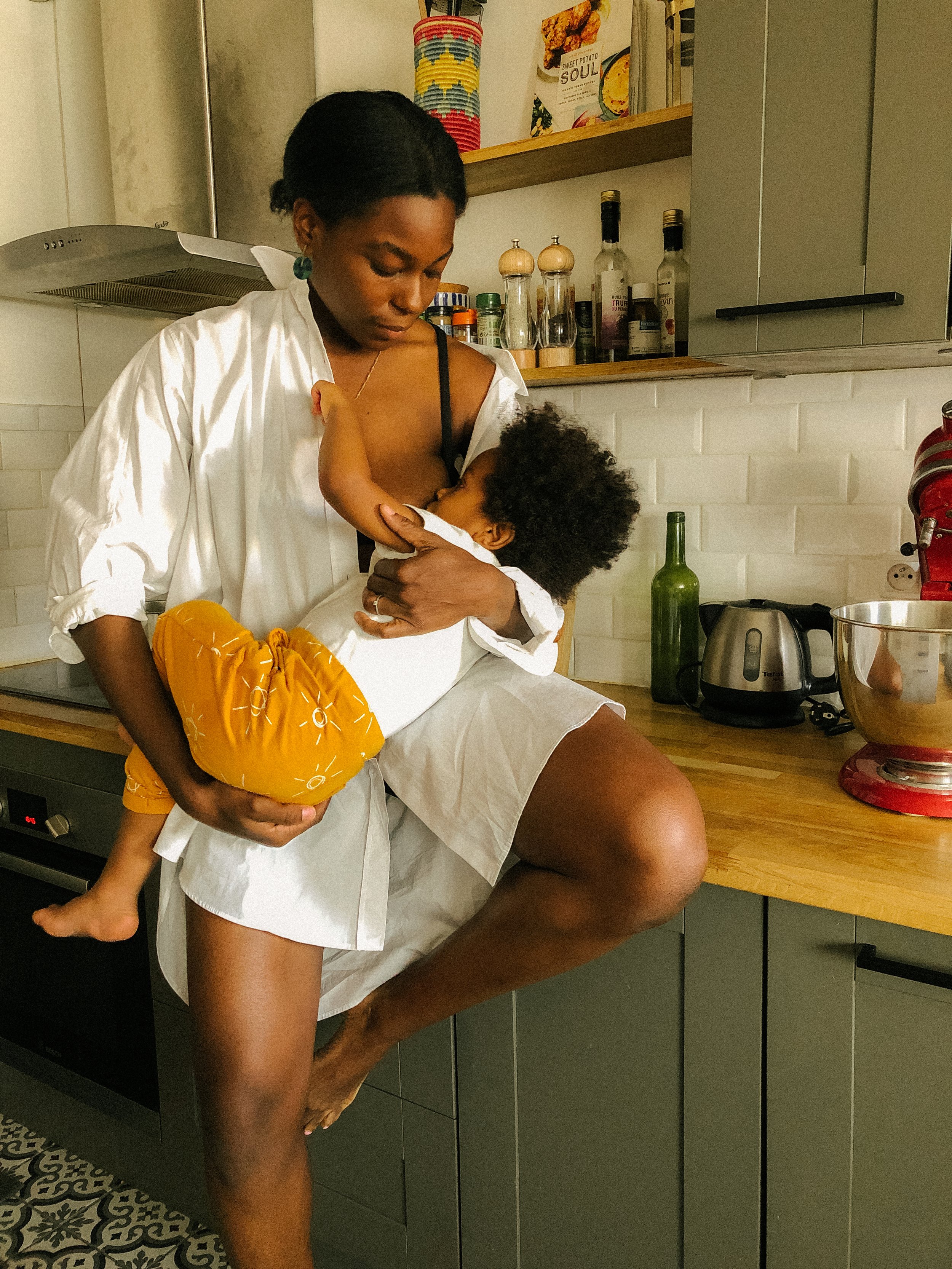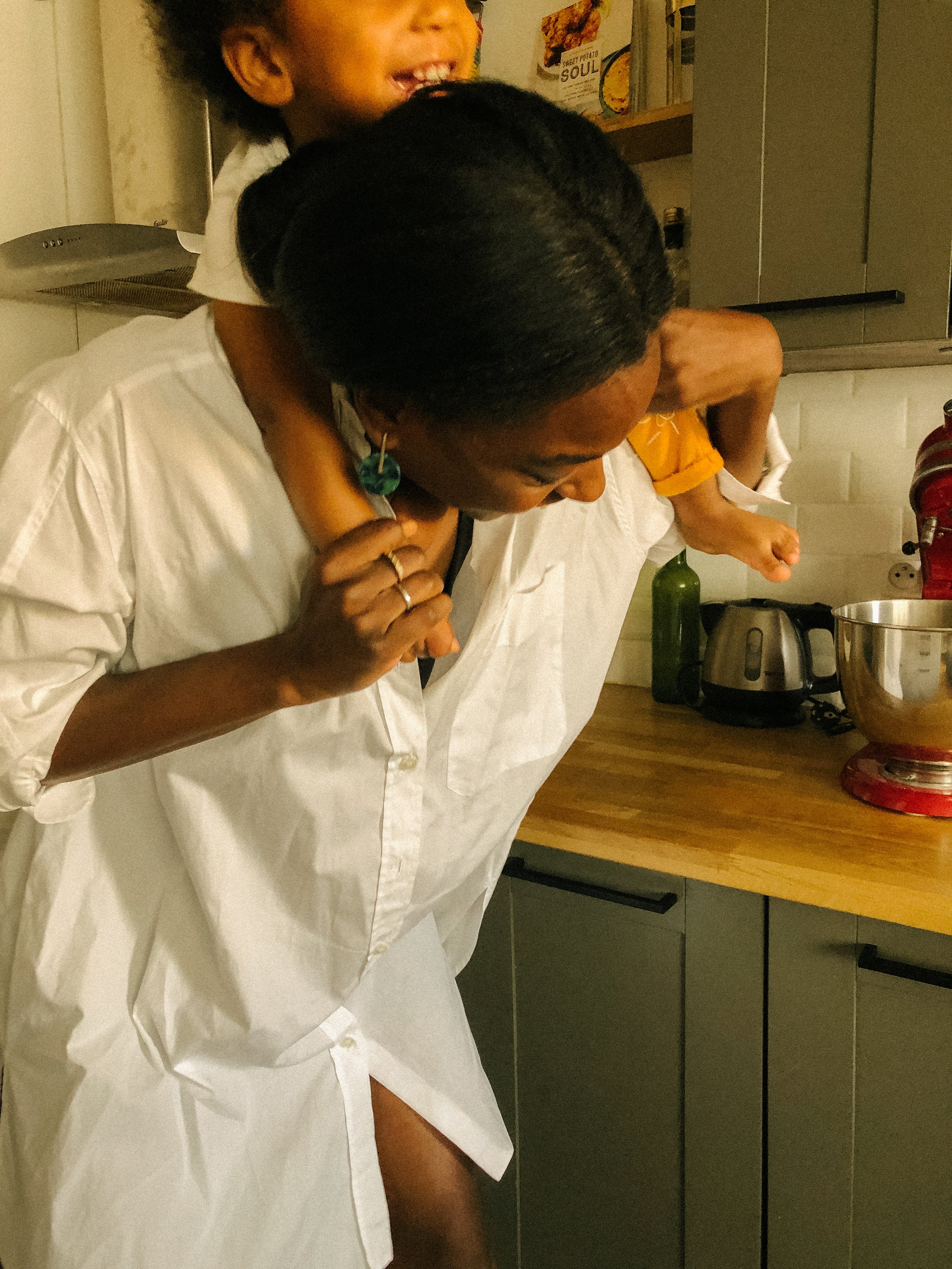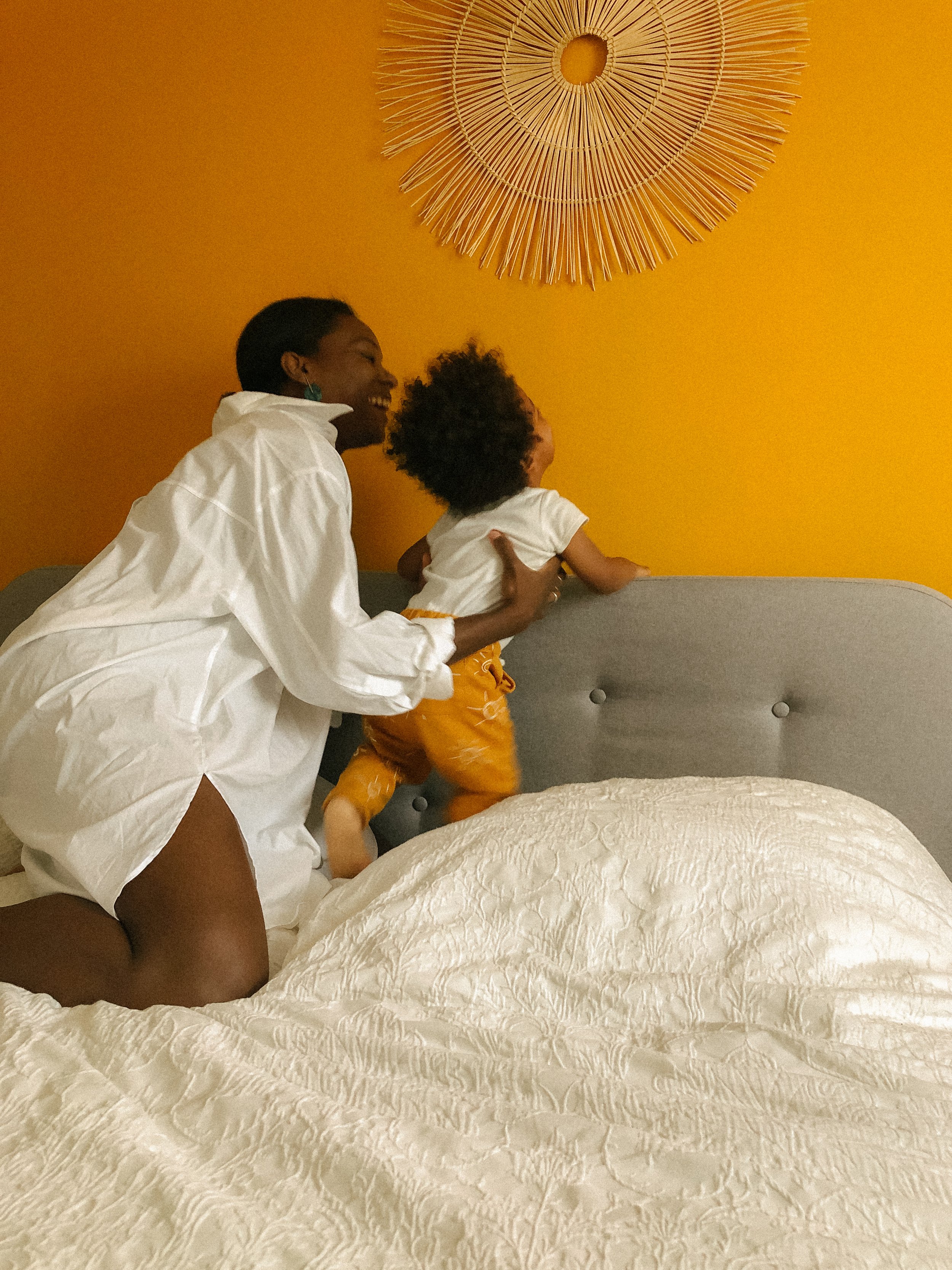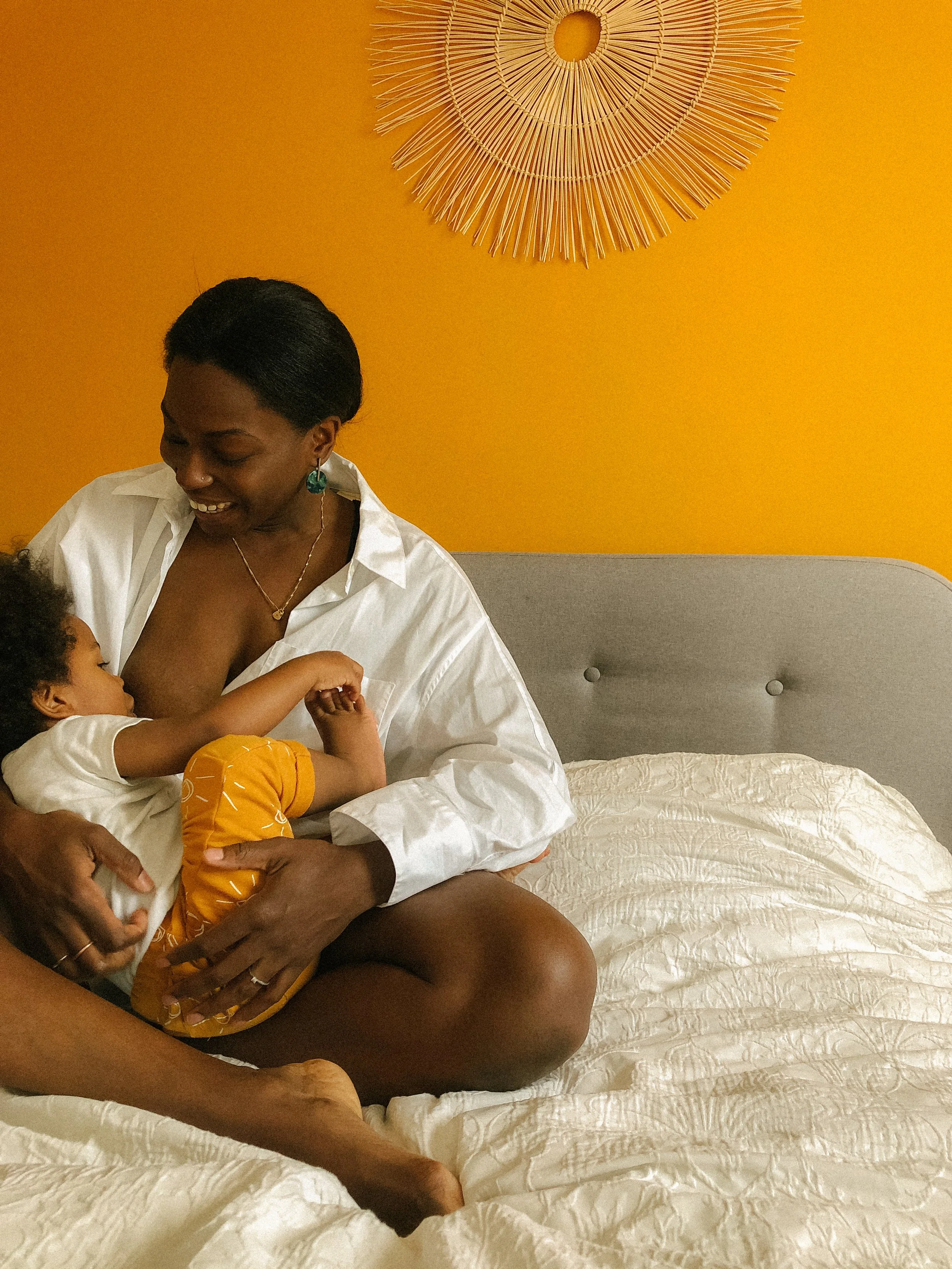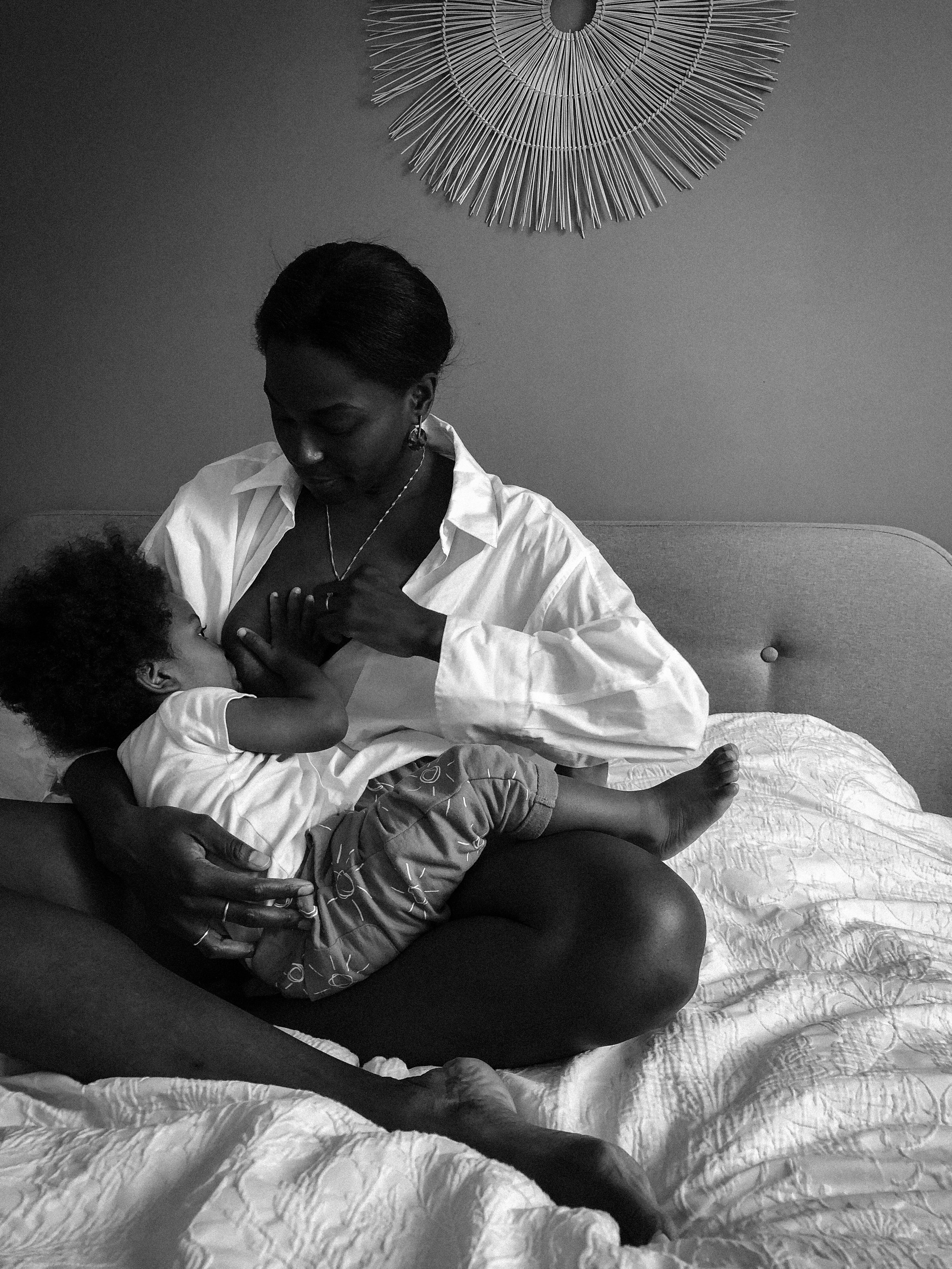Maya Dorsey of RESTore.Her Postpartum, France
Photography: trinacaryphotography.com // @trinacaryphotography
Maya Dorsey is a Los Angeles-native that has been living in Paris, France, for the past ten years and is the founder of RESTore Her Postpartum, a company that creates postpartum recovery kits to empower mothers to prioritize REST (Recover.Eat.Sleep.Thrive) during postpartum.
Introduction
Can you give me a little background on yourself?
My name is Maya and I was born and raised in Los Angeles, California. I’m a public health consultant, entrepreneur, and I love all things related to food and travel. I’ve traveled to over 35 countries and have lived in different cities of which New York is the place I lived in the US, where I met my partner who is French. In 2011 I moved abroad to Sevilla, Spain to teach English and to improve my Spanish, and later moved to France where I currently live with my little Franco-American family.
What brought you to France and how long have you lived there?
I originally moved to France in 2012 to pursue a Master of Public Health degree in Paris. My program was for two years, and once I graduated I felt like I still had more to see and discover in Europe.So I decided to stay to gain some professional experience in Public Health in France. I ended up finding work, and managed to set up a life here on a long-term basis and I pretty much feel like an adopted Parisienne now.
Can you tell me about your business?
I’ve always been someone interested in health and wellness, and once I found I was pregnant I became fascinated in all things related to motherhood from the amazing changes the female body goes through during pregnancy, to positive birth experiences, down to how moms are cared for (or the lack thereof) after giving birth.
After having my son, I had a really difficult time recovering and I found a lot of comfort and healing through food which sparked the idea of creating a business focused on postpartum recovery through food.
RESTore.Her is my new baby that I am in the process of getting off the ground which aims to empower new mamas to prioritize taking their time to Recover, to Eat nourishing foods, to Sleep when they can, so that they can Thrive Postpartum. I was really inspired from traditional cultures' postpartum practices, that aren’t widely practised today. Right now I’m in the process of creating a series of postpartum nutrition recovery kits specifically designed to help moms in their transition from the hospital back home by providing nutrient rich meals designed with postpartum experts that will help jumpstart healing after their baby is born.
How many children do you have and what are their age(s)?
I’m a new mom of one to the most precious baby boy who just turned 1 years old.
Pregnancy
Can you share about your pregnancy?
I found out I was pregnant in January of 2020 right before the world shut down due to COVID. In the beginning I was a bit scared, overwhelmed with not knowing where to start navigating prenatal care here,and excited at the same time. I had heard so much about how France is a great place to have kids and I was excited to learn about how the system worked here for moms, especially given my public health background. Then COVID hit and all the things I was excited about for my pregnancy like doctors visits with my partner, meeting other pregnant women, birth preparation classes, traveling to see my family while I was pregnant were no longer feasible. Physically my pregnancy went pretty smooth, except for having extreme fatigue during my first trimester. Emotionally, it was difficult having to adapt to doing the majority of my doctors appointments alone, my birth preparation classes being online, and the isolation of being in confinement and not being able to see my family while I was pregnant.
What type of prenatal care did you receive throughout your pregnancy? Is this common in France?
I was thoroughly impressed with how comprehensive prenatal care is here in France. I chose to be followed by a gynecologist for my prenatal care at a private clinic where I decided to give birth. Every month I had prenatal visits with my doctor, and blood work done. I also had sonograms in the first, second, and third trimester. In addition to my doctor, I also worked with a midwife during my pregnancy who I saw for all my birth preparation classes. In France it is common to work with a midwife either from the hospital where you give birth or to choose one who is not attached to one specific hospital that follows you while you are pregnant as well as once the baby is born.
Is there any attention given to preparing women both physically and psychologically for birth?
From what I have observed, things are pretty focused on the physical preparation of birth. However, there are professionals that focus on the more mental and psychological aspects of birth preparation too. For example, the midwife I worked with had training in sophrology and she offered birth preparation sessions focused on sophrology techniques to help mentally prepare. If having a more holistic birth preparation is a part of your birth plan, I think it is definitely feasible, you just have to do your research to find professionals that focus on both physical and psychological preparation. This was something that was really important to me. In addition to my more standard medical care, I’ve also decided to work with various other professional like an osteopath specialised in pre and post-natal care, an acupuncturist who is also a midwife, and a haptonomist which is a practice to help connect with the baby in utero.
What are the attitudes toward pregnant women? Do you receive any special “care” and has this impacted you personally in any way?
During my pregnancy I didn’t really notice any specific attitudes towards pregnant women. I just noticed in general people were particularly nice to me when I was in stores, or while taking the transportation.Strangers would randomly spark up conversation asking when I was due or if I knew the sex of the baby, which I found interesting. And friends and family checked on me a lot to make sure the baby and I were ok.
Birth
What have you found the attitudes towards birth to be in France? Relaxed? More medical-based?
I would say birth is definitely more medical-based here as most people give birth in a hospital setting here. There are however some doctors and clinics that are known for having a more holistic mother-centered birth approach, however it is something you have to proactively look for.
Can you share a little about your own birth experience?
During my pregnancy I read so many books focused on pregnancy and birth. My partner and I came up with a birth plan which felt a bit abstract as I didn’t have set expectations besides really wanting to have a positive birth experience, and to feel empowered and supported by my birth team. Once the actual day came, my birth ended up being something completely different than what I imagined and planned for. In a nutshell, when the big day came I made my way to the hospital shortly after I realized my water broke and went to the hospital to confirm that was the case. This was around 11am in the morning, and the midwife who examined me confirmed my water did indeed break and that I needed to stay at the hospital. This was about 4 days before my due date, so I was excited to know I would soon be meeting my baby. At this point I was having mild contractions and dilated at 1-2cms. I was optimistic that things would continue to progress, and that I would try to go as long as I could without an epidural. Around 2pm I was able to go down to my room to labor as my contractions were getting stronger and my midwife recommended I take a hot shower, and they gave me an exercise ball to use as well. Around 4pm I got checked again, and was only at about 3cm. I wasn’t too worried about not dilating more than the last time I was checked,I just kept trying to focus on keeping calm, and trying the different breathing techniques I learned to get through contractions. I had been managing through contractions, but I had been throwing up a lot and started to get really tired. Since I was only at about 3-4cm I knew I could be laboring for a while to get to 10cms so I ended up asking for an epidural around 7:30pm to be able to get some rest and have a bit of relief from the contractions. I asked for a lightly dosed epidural because I still wanted to feel sensations and was able to move my legs. I would say around 9pm things took a shift and I was informed (rather traumatically, but that's a story for another day) that I would potentially need to have an emergency c-section as my baby wasn’t handling the contractions very well and I was still only dilated to 4cms. I was devastated and immediately broke down and was so scared. I had no idea what a C-section entailed, even though we covered it in one of my birth preparation classes, I just never thought it would be an option for me. Things moved really quickly once my doctor confirmed I needed to have a C-section. Thankfully my doctor saw how upset I was and she gave me a few minutes to gather myself, she allowed my partner to come with me in the operating room, and answered the questions I had as they were preparing me for surgery. My son was born healthy and I was safe as well which was the ultimate concern of my doctor. I was able to see my baby briefly before they took him to get checked and while they finished taking care of me. Once I made it to the recovery room I was able to do skin to skin with my baby and had calmed down from all the panic of having an emergency c-section and couldn’t take my eyes off my baby. It took me a while to accept my birth story but every time I look at my little guy's face I am filled with so much joy!
Where did you give birth (home/hospital/birthing centre)? Is this typical in France?
In France most women give birth in either a public hospital, or a private clinic. You are encouraged to choose a hospital that is no more than 30 minutes from where you live by public transport, to ensure you can make it there in time. Where I live, the nearest hospital was a large public hospital, and I knew I wanted to give birth in a smaller structure, so I chose a small private hospital that was about a 15-20 minute drive from my place. There are a few birth centers in the region, in Paris there is one that is particularly interesting as it is a birth center that is run solely by midwives which I found interesting. Birth centers and giving birth at home are less common in France than in other parts of the world.
If hospital, how long do you stay in hospital following birth?
I stayed in the hospital for four nights.
What types of pain relief are available during birth?
I don’t remember the exact names of the medicines I was given, but I do remember receiving pretty mild pain medications (something equivalent to an over the counter pain reliever). Since I had an emergency C-Section I was in a lot of pain afterward, and I remember asking for something a little stronger and the nurses were really hesitant to give me anything stronger. I am not sure if it was mainly because I was breastfeeding or if it is standard to provide mild pain relief.
Are there any recommended ways to support physical healing of the body following birth?
After giving birth I was instructed not to lift anything heavier than my baby and to take it easy, since I had a C-section. I was also prescribed pelvic floor therapy and abdominal therapy after birth by my doctor which is pretty standard here which I find great. I still think there is a lot to be done here in encouraging women to truly rest and recover after birth instead of feeling pressure to pick things back up where you left them before you were pregnant. The length of maternity leave is rather short (16 weeks total) compared to other European countries, so the pressure to get back to work after birth could also be a contributing factor.
What type of appointments typically follow birth and will these be in-home or out-of-home visits?
During my stay at the hospital my days were filled with visits from my doctor, an anesthesiologist, midwives,nurses, doctors, a psychologist, and lactation specialist. It was tiring but it was nice to feel like you are being checked on and have help while you are healing and discovering how to take care of your baby.
Once you return home, you have in-home visits by your midwife to check on you and the baby up to 12 days after birth which is completely covered by the national health care system. The midwife comes to weigh the baby, provide support for caring for the baby, makes sure the mom is healing, helps to support breastfeeding, and any other things the mom or baby may need.
Typically at 6-8 weeks you also have a postnatal follow up appointment with your doctor to make sure the mom is healing well. After this appointment if your doctor clears you can begin pelvic floor and abdominal therapy.
Postpartum
What do you personally believe were the most important things in aiding postpartum recovery for you both physically and emotionally?
Since I had no family in Paris to help me after birth, it was really important to me to be able to rest and just focus on my new baby. My partner was a rock star in truly taking care of me, the baby, making sure we were all fed, and that the house maintained some form of order. Food was also an important element of healing. I knew I wanted to be intentional about eating nutrient rich foods that would help with my physical healing and to help with my milk supply. Emotionally, I think it was really hard being isolated. Normally when you have a baby you have visitors to help you, but we couldn’t as France was in its second lockdown after I had my son. On top of being a new mom, and feeling like a fish out of water to take care of a little human, I never anticipated the level of fatigue I experienced. All of these things didn’t make for the best combination and I felt pretty overwhelmed.
Is there any support for mother and baby during the “fourth trimester”?
Visits with my midwife once I returned and the weeks after giving birth were pretty helpful for me. Especially since she came to my house and I didn’t have to stress about taking the baby outside, and mustering up the energy to go somewhere.
As far as the baby, there is a 10 day check up appointment with a pediatrician after the baby is born. For the first year, the baby has monthly check ups up until 6 months, then at 9 month, 11 month, then 12 months. There is also a place called the PMI which is a maternal and child center financed by the government. The center is made up of pluri-disciplinary professionals such as doctors, nurses, psychologist, midwives, and parenting educators where you can take your baby for check ups, attend workshops related to parenting, and there is also support for mothers ranging from lactation support to therapists. There are PMIs in every neighborhood and it is a great complementary resource.
Are there any “new mother” groups that you can join and did you join any?
I think you have to be really proactive in finding mom groups. I was recommended to a few in my neighborhood, that I joined Facebook but I haven’t really been active yet. During my pregnancy I really wanted to meet other moms which wasn’t possible due to COVID, so I have been pretty proactive in reaching out to other friends that have kids. I also find that going to the park with my son is such a great place to meet other moms and families. All the parents are super friendly, and it's easy to spark up conversation. I’ve also been going to a lot of ‘baby friendly’ places or cafés in Paris which have been a nice outlet to connect and meet other moms.
What is the culture around taking newborns out in public? Do you wait a certain period for taking the baby out into public spaces?
Sometimes when I walk in the street I am surprised how many strollers I see with small little babies inside that look like the baby was born just weeks or a month ago. I’m not sure there is a set time frame people wait before taking the baby out into public spaces. I know for us, we wanted to wait a bit until the baby’s first vaccines at 2 months before moving around a lot outside. Paris unfortunately isn’t the most baby friendly city, so we spent a lot of time at home in the beginning months.
Is there government-supported maternity or paternity leave and if so, for how long?
Yes. In France there is maternity leave that starts at 16 weeks (6 weeks before birth and 10 weeks after) and the amount of weeks increases for the number of kids you have and if you are having multiples. For example if you have twins you have a total of 46 weeks (24 weeks before birth and 22 weeks after).
Fathers have a congé de naissance (birth leave) that is three days after the birth as well as paternity leave which recently increased July 2021. It went from a total of 11 days that had to be taken consecutively up until three months after birth. Now paternity leave is a total of 25 days that can be split over time after the birth .
Typically who cares for the baby during the newborn stage? Mother? Partner? Extended Family? What was it like for you personally?
Speaking from my own experience, I would say the mom just because the newborn stage the baby needs their mom a lot. I breastfed exclusively so I feel like my days revolved a lot around feeds. However, my partner helped out in a lot of other ways with changing diapers (I don’t think I changed a diaper until weeks after my baby was born), waking up in the middle of the night to help put the baby back to sleep, dressing the baby, and bath time. My parents are based in the States and my in-laws live in the French Alps which is about a 4 hour train ride away so we don’t have our parents nearby. But we try to see my in-laws every couple months and they are a huge help when we need extra hands, and we’ve been able to go stay with them for a couple weeks at a time to get our bearings.
Can you speak at all to the culture around newborn sleep in France? Particularly of expectations for sleeping through the night, self soothing, etc.? What are your personal thoughts on this?
There is a huge culture in France around babies that “faire ses nuits”, sleeping through the night. Once you have kids I feel like it is a topic that comes up with friends, family, and random people you may encounter that ask you how your kid sleeps. My son isn’t the best sleeper, and it has been a huge source of stress for me, so I often try to avoid the topic when people bring it up. Everyone has their own thoughts on how to get their babies to sleep through the night, or their miraculous methods that worked for their baby from doing pop-ins, self-soothing, crying it out, to making sure the baby drinks a bottle of formula so their stomach is full and won’t wake up hungry. When it comes to sleep, this is something I wish I spent more time researching before my baby was born to have a little bit of understanding of newborn sleep and different techniques,instead of trying to understand everything in the thick of the newborn fog. I think every baby’s sleep journey is different and as parents you have to be in tune with your baby's needs, and the techniques you feel comfortable with. What works for some babies, won’t necessarily work for yours.
Breastfeeding
Can you share your feeding journey?
Did you breastfeed your child? Can you share a little bit about your journey?
Yes I did. I knew I wanted to breastfeed and didn’t really know how long I would go for. I originally thought 5 or 6 months would be a good amount of time. The beginning of my breastfeeding journey was really rough. My son latched well from the beginning but we discovered he had a tongue tie which was preventing him from getting enough milk, and made breastfeeding really painful.
I got cracked nipples really early on, and almost wanted to quit after the first few weeks as I was in so much pain. My midwife helped a lot to find a specialist to take care of my son’s tongue tie, and I found a great lactation consultant which ended up being a game changer.
Once my son and I found what worked best for us, breastfeeding became so much easier and something I really enjoy. I love the special bonding time I have with my son and I am still going strong with breastfeeding 12 months in and counting.
Do you think breastfeeding in public is socially accepted in your country?
Since I gave birth during the second confinement here in France, I ended up spending the majority of my time at home. It wasn't until recently when things started opening back that I began to venture more outside for coffee dates with friends, or to do outings as a family that I’ve needed to breastfeed in public. When I’m out and need to feed my son my priority is that he eats and I haven’t had any issues so far (knock on wood), however I do feel paranoid that someone will say something to me.
I have friends who have had issues, or get weird looks from people. There have also been recent instances in different parts of France where women have been asked not to feed their baby in public or even harassed and assaulted which is really sad to hear. So I think there is a lot of work to be done to normalize breastfeeding in public, that it isn’t something that is sexualized, and at the end of the day a baby needs to be fed which shouldn’t inconvenience anyone. A French photographer named Ana Kï , based in Bordeaux is doing a lot of inspiring work on this topic by organizing photo shoots in different cities in France where she invites mothers to be photographed breastfeeding in public to really work towards changing society’s view of breastfeeding in public. This October, Tajine Banane, a French breastfeeding clothing brand launched a campaign “Allaiter Partout. Tout le temps.” (Breastfeed Anywhere. At Anytime) that defends mothers’ rights to breastfeed when and where they want. They put up a beautiful series of posters of mothers breastfeeding throughout the streets in Paris, to bring the topic to light, and to really empower women and to gain support on this topic.
Is breastfeeding support readily available?
Yes midwives provide some basic support with breastfeeding, and there are also lactation consultants that you can go to for support, however they aren’t reimbursed by the national healthcare system. The PMI centers (which are dedicated to maternal and child health) I mentioned earlier sometimes have lactation consultants there which are completely free. I feel like breastfeeding is one of those topics that you have to make sure you have a knowledgeable professional supporting you and to shop around for the best person who is in line with your breastfeeding plan.
How long do babies typically breastfeed in your country?
It seems as though babies are breastfeed for about three months on average. There is an interesting statistic from a national epidemiological study that states: 74% of women breastfeed at birth, then the percentage significantly decreases to about 39% at three months, to about 9% at one year, which gives you a bit of a picture of breastfeeding in France. In my circle of friends I know a lot of moms who have breastfeed outside of the norm for anywhere between 6+ months up to 24 month which has been really motivating for my personal breastfeeding journey. Overall, I think the duration of moms’ decision to breastfeed is highly related to the length of maternity leave in France which is only 10 weeks after the baby is born, and the time when women go back to work.
France
What is your favourite thing about being a mother and raising children in France?
I would say my favorite thing about being a mother is the little things like watching my little guy grow and discover his surroundings. As for raising kids in France, especially being from the US where the health system is completely different and essentially more costly. One of the biggest things I have been most grateful for is the care I received when I was pregnant, as well as after birth. I’ve been amazed with quality and how accessible and how affordable things have been which takes away a huge financial burden of having kids here. I never questioned things like whether my insurance would cover my prenatal care or birth, if I would have paid maternity leave, or whether my care after birth would be covered. All these things I definitely would have worried about had I given birth back home in the States.
If you think the world could learn one thing about how France approaches pregnancy, birth, & motherhood, what would it be?
I think France does a really good job with generally taking care of mothers and families. From prenatal care being comprehensive and covered through the national health system, having maternal and child prevention and care centers in every neighborhood, down to daycares being subsidies (even though it is really hard to get a spot). There is even an office called CAF that has specific assistance for families ranging from rent assistance or monthly stipends for your children (that is calculated based on how much you earn). Even though Paris isn’t the most kid-friendly place in terms of infrastructure for things like not having enough elevators in metro stations for strollers, or no place to change a baby’s diaper in small Parisian restaurants. There are a lot of social resources and activities catered to parents and families which I think is really great.
What is one piece of advice you would like to give other mothers?
Nobody knows your baby’s needs better than you mama! Between information overload from Google, unsolicited advice, and not always consistent recommendations from your health care providers it can be confusing. But at the end of the day, even if you don’t feel like you don’t know what you are doing, you know what's best for your baby, and don’t let anyone tell you otherwise. You got this mama!

